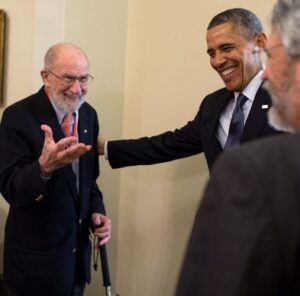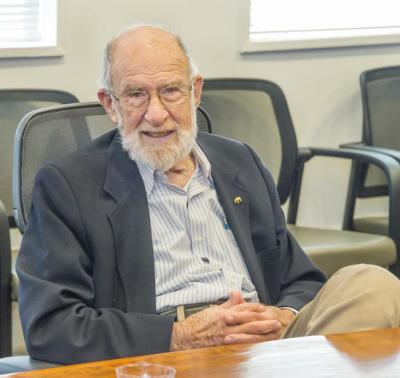
Andy Sessler wins the Presidential Fermi Award, 2014
Andrew Sessler, award-winning theoretical physicist, acclaimed humanitarian, and former director of Berkeley Lab (1973-1980) who founded both the Earth Sciences Division and what is now the Environmental Energy Technologies Division, has been named a recipient of the Enrico Fermi Award by President Obama. One of the federal government’s oldest and most prestigious prizes for scientific achievement, the Fermi Award is administered on behalf of the White House by the U.S. Department of Energy. It carries an honorarium of $50,000 and a medal. Sessler shares this year’s award with chemist Allen Bard of the University of Texas.
“Allen Bard and Andy Sessler have advanced the science and technology frontier throughout their distinguished careers and, in doing so, have contributed greatly to sustained U.S. leadership in research and development,” said Secretary of Energy Ernest Moniz. “I congratulate them for their achievements and hope that the example they set serves as inspiration to future generations of scientists and engineers.”
Sessler was selected for his “outstanding contributions to the establishment of the beam-physics knowledge basis that has underpinned the development of current-generation particle accelerators and storage rings deployed at leading research institutions throughout the world.” Bard was selected for his pioneering contributions to the field of electrochemistry.
“Andy Sessler changed the face and character of Berkeley Lab,” says current Berkeley Lab Director Paul Alivisatos. “He successfully made the case for science to aid our country during its first energy crisis and helped establish the Lab’s efforts that brought about important technologies and standards that have improved the way we conserve and consume energy.”
Sessler, 85, first made his scientific mark in the 1950s with foundational work in particle accelerators that provided the basis for today’s colliders, including the Large Hadron Collider at CERN, synchrotron light sources, such as Berkeley Lab’s Advanced Light Source, and free-electron lasers. In addition, he and collaborator Keith Symon were one of the first to report on stochastic phenomena, or chaos, in particle accelerators.
“I was very fortunate to be a theoretical physicist in the early years of particle accelerators,” Sessler said. “We were able to apply theory to single and multiple particles effects in beams, which taught us how to obtain the intense beams necessary for colliders, synchrotron light sources and free-electron lasers.”
For his physics research, he has received the Lawrence Award and the Wilson Prize.
Sessler was 44 when he became Berkeley Lab’s third director, just two weeks after the start of the 1973 oil embargo, when gas prices soared and gas station lines extended for several blocks. In response, his first action was to establish what was then called the Energy and Environment Division.
“I felt the future of the Laboratory was in other directions as well as high energy physics,” said Sessler, an avid backpacker and skier who often rode a bike to work, in discussing the sea-change at the Laboratory he initiated. “I’d always loved the outdoors, and preserving the environment was a big concern. Seeing that the U.S. was developing a national energy plan, I knew we were one of the few places in the country with the expertise to help.”
In addition to his ground-breaking work in particle accelerator and beam physics, and his leadership in directing the scientific research landscape toward new horizons in sustainable energy and the environment, Sessler is also being recognized for his public advocacy of scientific freedom and other humanitarian causes. During the Cold War era, he was a co-founder of the human rights group “Scientists for Sakharov, Orlov and Sharansky (SOS), scientists who were persecuted as dissidents in what was then the Soviet Union. For this effort, in 1994 he became the first recipient of the American Physical Society (APS)’s Dwight Nicholson Medal for Humanitarian Service.
“I like to think that many physicists look up, on occasion, from their experimental apparatus or computer screen, to see that all is not well with the world, and devote some time, effort, and money to help,” he said, when he received this award. “The opportunities are there, and the need is there, for the struggle for human rights is an eternal one.”
